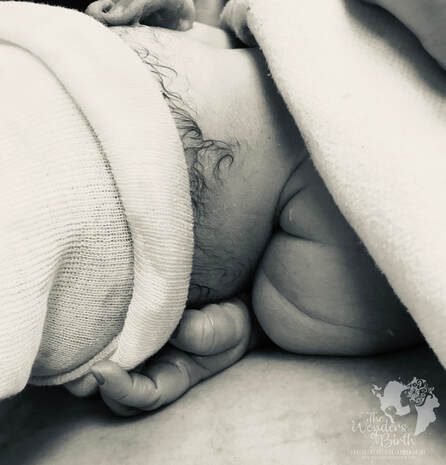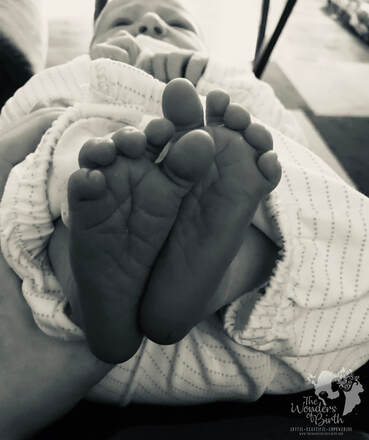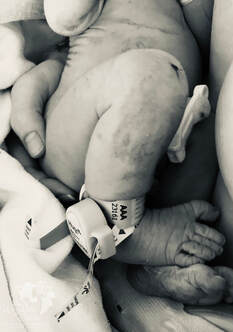|
There is a buzz in my area surrounding Birth Keepers. Who are they? From what I can figure out through my own research, Birth Keepers go through a weekend training of some sort, then calling themselves "Birth Keepers" and encourage mothers to have basically unassisted births at home without a trained midwife. I have heard that they will claim that Certified Professional Midwives (CPMs- midwives who undergo training and receive a national certification to work specifically in out of hospital settings) are "too medical" and they-the Birth Keepers-will give you the natural care you are actually looking for.
But I have some questions for Birth Keepers: What qualifications do you have for making medical recommendations? A weekend course for giving comfort care to a mother in labor is great for doulas! But the training should include instruction on scope of practice. Medical advice is outside the scope of practice for a doula. Doulas can suggest questions for mothers to ask their provider and they can suggest that any medical interventions suggested be discussed with potential benefits and risks considered. But to give outright medical advice is outside of their scope of care. I have heard of a situation where the Birth Keeper was giving medical advice to a mother-who was very much in need of hospital care- to not do any of the things this woman's caregiver suggested to her so she could have a safe and healthy birth. Sadly, the baby passed away because the mother had declined many interventions and even in-depth monitoring at the advice of her Birth Keeper. What training have you had to take care of medical emergencies that are rare but can happen in a Homebirth setting? Birth Keepers might suggest to their clients that they don't need to have trained midwives at their births. That they can just allow nature to take over and that their bodies will naturally do whatever is necessary to birth their babies. Birth is a natural process, but so is death! Are they willing to take responsibility if the worst outcome happens, if that outcome could have been prevented by simply having a qualified caregiver at their birth who would have been trained to handle the most common emergencies? CPMs often bring emergency equipment, medications and sometimes even IV fluids to births and are specifically trained to provide resuscitation measures to help babies who are slow to breathe on their own at the birth. They can normally stop excessive bleeding using medications and other methods to make sure moms stabilize after the birth. If hospital care is needed, they should be trained and prepared to recognize such situations and arrange transport. Birth Keepers do not have such skills and are not prepared to handle emergencies. Sadly, that could be the difference between life and death for the mother and baby! Mothers need to really know who they are hiring for their Homebirth and whether or not that person is adequately trained and knowledgable to handle emergencies. Not even all CPMs are the same! Some have not had enough training, because the minimum requirements to become a CPM are really not enough. The midwife you hire should have much more training than the minimum requirements. Are you being upfront and honest with the mothers hiring you? If you are not a trained midwife, be honest about that. Mothers hiring Birth Keepers or doulas need to know what services they receive from you and what your scope of care is. When mothers interview their doula, "Birth Keeper", or midwife they need to ask good questions that allow them to ascertain the person’s education, training, qualifications, back-up plan, certifications, number of births they have attended, etc. Ask really good questions. For the Doula or Birth Keeper you may want to ask: *How many out-of-hospital/home births have you attended? *Will you give me medical advice? *Will you support me hiring a midwife to provide medical care for me? *Tell me about your training and qualifications? *What comfort measures do you offer? *How will you support my husband/partner during pregnancy, labor and birth and involve them in my birth process? For the Midwife you may want to ask: *What are your qualifications/ how did you gain experience? *Are you a Certified Professional Midwife/Licensed Midwife? *Tell me about your training *What does your prenatal care look like? *When do you come to your clients in labor? *What care do you provide in labor and birth? *What postpartum care do you provide? *What happens if I do not want the interventions you are suggesting? (Will there be any alternatives offered? Will I be able to say "no" to your suggestions? Will you explain why you make the suggestions you are making?) What kind of testing do you offer? How do you handle the more common emergencies that might come up at home such as baby not breathing right away/mom bleeding excessively after birth? Will you provide comfort measures in labor or are you only there to provide medical care? Most CPMs will offer wholistic care. They are not commonly "overly medical". Often, they will want to do minimal. important testing and thorough prenatal care. and will give you space and quiet while you labor. At the same time, a good qualified midwife is going to watch over you and your baby carefully to make sure no unexpected complications arise. But those unexpected complications, though rare, are the reason you hire a midwife (often a CPM) to provide you with prenatal, labor and birth and postpartum care! They are ready to step in if needed to handle emergencies. You want your chosen caregiver to be someone who is not only respectful but knowledgable and steady under pressure. I am concerned that Birth Keepers are going to give Homebirth midwives a bad name and make Homebirth less safe. It is already difficult enough to find a good midwife in places like North Carolina, since pretty much all the Homebirth midwives are forced to practice underground. You can go over the boarder and have a "legal" midwife attend you in South Carolina or Virginia, but that will come with a big huge rule book, and some who feel they would be safe staying home will not be allowed to be attended by a legal midwife because of the tiny box in which they want home birthing moms to fit. I just want to address one more thing before I close. It is very common for people to balk at the cost of Homebirth. They don't want to spend "that much money". But the Homebirth midwife goes above and beyond to give mothers the best care. Often much better than what they receive with a busy hospital practice, simply because hospital staff and doctors are overworked and have a huge amount of patients. A Homebirth typically doesn't cost even as much as most hospital co-pays for most people. And if you recognize the value of what you get in a good Homebirth midwife, you will realize you are getting a phenomenal deal. How many doctors or hospital midwives sit with their patients throughout active labor? Hardly any. Most are coming in at the last minute to catch the baby once the nurse sees baby is crowning. How many hospital nurses hang out in your room the entire time you are in labor? Hardly any! Most are going to hook you up to a monitor they will watch from the desk while doing a mountain of charting on their many patients. How long are your OB/CNM prenatal visits? 5 minutes long? 10 minutes? After you've waited an hour in the waiting room? How many questions do you manage to ask them before they shuffle you off down the hall to schedule your next appointment? With a good Homebirth midwife, you get at least a 30 min visit if not an hour long visit every time. You get someone lovingly feeling the position your baby is in and being excited about your pregnancy. You get someone who wants to answer all your questions and to help you stay low risk. There is so much more you gain, it is well worth the investment! What about you? Do you have any experience with a CPM or out of hospital caregiver? Have you worked with a Birth Keeper? Do you have advice for others? Please leave your comments below. You can help others as they are making decisions concerning their births. Thank you.
0 Comments
 I have had several doula clients feel forced into agreeing to an induction because they are coming up on 42, 41 or even 40 weeks of pregnancy. Although there are some instances when an induction is indicated (and I DO encourage open communication with your care provider if you are facing an induction for any reason), coming to an arbitrary date should not be one of them. I have discovered some little-known “secrets” about babies bore after 40, 41 or even 42 weeks. To be more specific, those that are allowed to come when ready instead of being evicted just because of passing an arbitrary date on the calendar: Babies born later are normally better at eating, sleeping and just overall more mature and often easier to care for than babies who are forced out before they are ready. The estimated due date is just that- it is a guess! I have read that just as apples ripen on a tree at different rates, babies are ready to be born at different gestational ages. A few will be ready very early and a few will be ready very late and most of the others will come somewhere in between. It can be helpful to think of when you are due in different terms than we are used to. Why not have a due month instead of a due date? Or consider telling people you are “due” 2 weeks after your 40 week date. Sometimes well-meaning friends and family consider your estimated due date to be a definitive “Do Not Pass” date. They fully EXPECT baby to come by that date. If you pass it, they are often more concerned with every passing day. It can be hard enough to wait for your little one’s arrival without your loved ones stressing you out. Now I would like to tell you some of the ways to help your baby stay put until fully developed and completely ready to be born. There are no guarantees but there are some things that can help: 1. I have found that some of the very best things you can do are to eat well, get plenty of pregnancy-safe exercise and rest, and also do what you can to reduce your level of stress in your pregnancy. Dr. Brewer studied pregnancy nutrition extensively and found that consuming 80-100 grams of protein (even 65-75 grams can make a considerable difference), getting at least 2500 calories of nutrient-rich foods and getting plenty of salt and fluids every day can decrease your chances of developing pregnancy complications such as pre-eclampsia which often leads to needing an induction and can help you avoid going into preterm labor. I wish that more providers pointed this out to expectant mothers! It is so important. 2. You can decline an induction if you are faced with one that has no actual medical indication. Be sure to make your wishes known and have some good discussion with your provider. Voice your concerns and ask for proof that what they are suggesting is actually needed (having a doula can definitely help you by providing information on the difference between a medically necessary induction and an elective one.) Many care providers actually believe that their clients WANT to be induced. So, if you are someone who does not want an elective induction, sometimes all you need to do is tell your provider you don’t want one. I encourage open communication as a top priority, but if you feel bullied, you do not need to show up for an induction that is scheduled against your will. You could also refuse to schedule one when told you need to do so. More and more clients are standing up for their Human Rights. You have the right to informed consent, which includes the option to decline ANY medical intervention (That includes induction as well as a cesarean delivery!). 3. You can switch providers from someone who is making you feel forced into an unnecessary or unwanted induction to a provider who is willing to be patient and trust that your body and your baby know when to start labor. I would love your feedback! Were you induced simply because you were “overdue”? How was your experience? Did you say “No” to a medical intervention that you did not want? How did that go for you? Do you have advice for others facing an induction for passing their due date? Please comment below! Sources: http://drbrewerpregnancydiet.com/ https://midwifethinking.com/2016/07/13/induction-of-labour-balancing-risks/ I first stumbled upon homeopathy for childbirth when I was working on my doula certification and was looking for things with which to stock my doula bag. I wondered if there was some sort of kit of homeopathy for birth, since I had experienced wonderful results with my own family using homeopathy. I searched Amazon and lo and behold, I found an amazing kit containing 18 different homeopathy remedies specifically chosen for use in pregnancy, birth and the postpartum period. I ordered that kit without delay. It is a handy little kit. All the remedies come in their own containers and it includes a small pamphlet which tells you which remedies are included and the complaints for which they may be helpful. In reading the kit, I found Mary’s Homeopathy Study Group on Facebook. It turns out that Mary, a Midwife and Homeopath, had been the creator of the kit to help clients and their loved ones as well as birth workers help the laboring mother have an easier birth, should a homeopathic be useful in labor and birth. I have learned so much about homeopathy through Mary’s group. I found out that homeopathy is probably the safest type of “natural remedy” one could use, since it is so diluted down there are not actually any molecules left, but the essence of the element is left. It is that essence that ends up curing the condition that the element itself would actually cause in measurable doses. For instance Ipecac would be something you would use to induce vomiting if, for instance, someone were to ingest something poisonous and you wanted to get rid of the poison. If you wanted to make a homeopathic remedy from Ipecac in the potency often used for childbirth-related conditions, you would use a 200c potency. “To make a 200C, the homeopathic pharmacy takes one drop of the herbal tincture (called a mother tincture) and mixes it with 100 drops of water (actually at 20% solution of ethyl alcohol; the alcohol acts as a preservative). The resulting dilution is succussed, producing a 1C potency. Then the cycle is repeated mixing one drop of the 1C with 100 drops of the solution, which, after being succussed, yields a 2C potency. After 200 cycles of dilution and succussion a 200C solution is produced, which can be dropped onto milk sugar pellets which I then hand to you.” (1) So, you see, the Ipecac that causes the vomiting in a regular dose is able to actually remedy vomiting in the minuscule homeopathic potency. That is the basic principle for how all the remedies work. They also work following the principle of “minimum dose”. Meaning the smallest dose possible taken only when symptoms return is the way to actually allow healing to occur. If you follow the label on most homeopathic remedies, you will normally not only waste your money, you may risk making symptoms return, by continuing to take doses with no symptoms present.
I find this fascinating! And it really does work in most cases, when you match the remedy correctly. I would like to share some examples of how I have used homeopathic remedies in real-life situations with my labor clients. One mother had to be induced with her 4 previous pregnancies. She made it to full-term with her 5th pregnancy, with the help of following the Brewer Eating Plan for Pregnancy, without developing pre-eclampsia (a first for her!) She began having strong labor contractions when she was full-term, so I headed to her house to help her. When I arrived, her contractions had completely ceased. 10 minutes had passed without a single contraction. We looked through the homeopathy booklet and found a remedy that seemed to match her symptoms well (that is a major key to homeopathic remedies working: you need to match the symptoms with the correct remedy the best you can in order for it to work. If you get the remedy wrong, you can try something else, if a couple doses do nothing). I gave her one dose and she let it dissolve under her tongue. Nothing happened, so in 15 minutes we repeated the dose. I looked through the pamphlet to see what I would try next, if that did nothing. However, within a matter of a few minutes, she began contracting quite well. In fact, her baby was safely born 3 hours later! I worked with a mother who experienced faintness while pushing. I looked through my remedy kit, found a match for her symptom and gave her a dose. I also saw that she was feeling extremely exhausted so gave her a remedy for exhaustion as well. After 2 more contractions, her baby was safely born! I had a client who experienced a rapid, precipitous birth. I gave her a remedy that matched her symptoms and within minutes she calmed down and was able to handle the rapid transition her body was undergoing. I have had numerous clients experience both nausea and vomiting for which a well-matched remedy resolved without them needing their nurses to give them medications (which they had wanted to avoid). Those are just a few examples, I have had many successes with other clients as well! As a doula, I make sure to always get the doctor to okay remedies before using them. I have only had one doctor not allow it, and it was fine because the client also decided she did not want to use the remedy. Other than that one situation, every client who has wanted to use remedies has had the support of their care providers. It is helpful when clients are able to speak with their care providers ahead of time and ask about using homeopathic remedies during labor and birth. If you would like to use homeopathic remedies to help your clients or loved ones during pregnancy, labor and birth, I highly suggest you join Mary’s Homeopathy Study Group on Facebook. You can find out more by reading the files. You can find additional information by visiting www.remedyseeker.com. You can find Mary’s Birth Kit (yellow) as well as several other wonderful kits she has put together at www.homeopathykits.com. If you have Amazon Prime, she also has them available for purchase on www.Amazon.com I have had wonderful results using the Blue Deluxe Kit to help my family and friends with acute illnesses and injuries, as well. This information was taken from knowledge gained through Mary’s Homeopathy Study Group, www.remedyseeker.com, and the above quote (1) is from: http://www.homeopathichealing.org/x-c-and-m-the-alphabet-of-homeopathic-potency.html Karen Gartner is a Registered Nurse who offers Craniosacral Therapy, a Certified Doula and Childbirth Educator. She enjoys studying all things related to birth and is said to be a wealth of knowledge to her clients and students. She began studying alternatives to mainstream medicine in earnest after the birth of her first child in 2003. Since that time, she has devoted much of her time to keeping her family well and helping other mothers learn how to do the same. She loves to spend time cooking and exploring the outdoors with her husband and children in her leisure time. You just found out you're expecting a new baby! So much is changing already! You want to know you are getting the best care possible to have a healthy and safe pregnancy and birth. Open communication is extremely important between care provider and the patient/client. A good care provider will not rush out of your exam room as quickly as they can get out the door, but will take the time to discuss your questions and concerns. They will also give you tips for how to stay healthy and low-risk. They will want to know about your nutritional intake and ask if you have been experiencing any difficult pregnancy symptoms or problems. They will offer ways to deal with those concerns, often sharing the safest options first. But how do you know your care provider is truly concerned about your well-being and that of your baby? How can you tell if he or she is interested in respecting your choices and allowing you the freedom to make decisions?
I'd like to share some "red flags" that *could indicate that your care provider is not interested in you making decisions about your care, but rather wants you to quietly comply with their standard practices, whether or not those practices are backed by extensive research. 1. Your care provider tells you that you or your baby will die unless you agree to their intervention or medication they are offering. Outside of true life-or-death situations, this could indicate you are being coerced into choosing the option the caregiver wants you to choose. 2. You are told that there are no alternatives to the intervention or medication they are offering you. That may very rarely be the case, however in most instances there are a few or multiple options available to you. For instance: you are told that the only option you have when you are "one week past your expected due date" is a medical induction. However, unless there is a true medical condition or problem with mom or baby, just coming to an arbitrary date does not necessarily mean an induction is your only option. Some providers will offer testing to check on baby, have more frequent visits to the care provider, and/or have the mother monitor baby's kicks throughout the day to ensure baby is safe while they wait for labor to start on its own, if possible.(1) 3. They will not provide you with actual current research. If they have thoroughly studied the topic, there should be different articles for or against different options. They should present you with the research and allow you to choose the option with which you are the most comfortable. 4. They tell you your baby is "too big", your pelvis is "too small" or your labor is "too long" to continue. Again, there may be rare circumstances in which these may truly be legitimate concerns, however research supports that the only real way to know if baby won't fit is to give the mother the chance to labor and birth her baby.(2) It also supports the fact that labors are all unique and should not necessarily be sped up simply because they are taking a long time. If mom and baby continue to handle the labor well, it should typically be allowed to progress at a natural pace.(3) 5. They are unwilling to allow you to make decisions such as delayed cord clamping(4), hiring a doula to support you and sometimes to help you avoid pain medication in labor (5) or "intermittent monitoring" of baby during labor (6). All of those are backed by research showing improved outcomes and/or a lower need for interventions for many mothers and babies. A provider who keeps up with current research will often give you more options to choose from. If you find your care provider is not willing to allow you to have a say in decision-making, please remember you have the option of changing providers! A good care provider will allow for open communication and will allow you to say either yes or no to decisions. You will not feel rushed or just like another number. You will feel you are respected as a person. If you are only allowed to give a yes answer but are not allowed to say no, is it truly consent at all? I would say that it is not. This information is mainly the opinion of the author, based on several years of experience. See sources to begin your own research. It is impossible to know what the "right" decision is for every situation. I highly encourage you to speak openly with your care provider about your birth wishes. If you feel you do not understand what they are telling you, ask questions and do your own research or consider hiring a doula to help your voice be heard. Seek out a second opinion if you feel it would benefit you. Listen to your mothering instinct which will often be a helpful guide for mothers! Sources: (1) https://evidencebasedbirth.com/evidence-on-inducing-labor-for-going-past-your-due-date/ (2)evidencebasedbirth.com/evidence-for-induction-or-c-section-for-big-baby/ (3)evidencebasedbirth.com/friedmans-curve-and-failure-to-progress-a-leading-cause-of-unplanned-c-sections/ (4)www.scienceandsensibility.org/p/bl/et/blogid=2&blogaid=526 https://jamanetwork.com/journals/jama/article-abstract/206143 (5)evidencebasedbirth.com/the-evidence-for-doulas/ evidencebasedbirth.com/using-a-doula-for-pain-relief/ *There are many ways to figure out if your situation is a true emergency or not. One method some families use to tell if they are in a life-or-death situation is to ask if they can have time to think about the intervention (in that case it is most commonly a cesarean birth that is being discussed). If the family is told there is no time to think about it, mom and/or baby will be in danger if they don't act right away, the family can be fairly certain that they are dealing with a true life-threatening emergency. This is a very vulnerable post for me, but as a doula, I see my clients in very vulnerable moments of their lives, so I decided I'd share these thoughts of mine with you anyway, in the hopes of helping someone find hope and healing.
When I was 36 I began to have excruciating pelvic pain. It was not just during my monthly cycles, but all month long. It was making me physically ill in many ways. My hair was falling out, large amounts at a time. I was having to take several naps each day just to make it through. I would nod off while driving (that was scary!), to the point where I stopped driving all together as much as possible. After several months of suffering with this while I prayed for God's guidance and healing, I finally found help for my problem through an out-of-state specialist. I truly believed that God had led me to this specialist and trusted that he could help me feel better and be able to function again. I told the specialist that I very much wanted to keep my uterus no matter what. I was still young and didn't know how it would affect me to have it removed at that point in my life. However, due to the high amount of trust I had in this doctor and in the Lord directing my path, I agreed to leave the final decision up to him during surgery. If my uterus seemed to be in such bad shape that he thought it best to remove it, I would agree to it. But I continued to stress to him that I really wanted it saved, if at all possible. I honestly thought it would not need to be removed and that the symptoms I was experiencing were caused by issues I have had flare up from time to time for many years. When I woke up after the surgery--still in the recovery room, the first thing I asked was, "Was he able to save my uterus?" The nurses said that no, the doctor needed to remove it. I felt like I had emotionally been hit by a truck. I was filled with anguish. How could this have happened to me? It was so hard for me to grasp. I just sobbed my heart out right there in post-op! The hormonal changes I initially went through were intense to say the least. I felt like I would imagine women feel like when they go through menopause and I still had my ovaries! I was told that most of the hormones are in the ovaries and that my hormones would be fine after the hysterectomy. They definitely did balance out over time, but that first year was very difficult. I spent the next several years vascilating between living in denial about the hysterectomy and weeping and mourning over the loss of it. My stomach would feel sick and I would feel a deep sense of loss just thinking about it. I found it easiest to function when in my heart I denied it. I just simply pretended like I still had my uterus, so I did not have to feel the emotional emptiness I felt whenever I remembered it had been removed and I no longer had the possibility of ever giving birth to another child. Physically, after my initial recovery which was a long 6 weeks, I feel great. I was able to care for my family like I had wanted to before but hadn't been able to do. I had more energy, could drive again, no longer needed to take naps and my hair stopped falling out! So, in my heart I knew the surgery was necessary, but I just could not get past the emotional side of it. Fast forward to 2018. I had a teacher in a class I was taking speak about the benefit of talking to our body parts before they need to be removed. Saying something like, "You've served me well, but now you're not functioning properly so you must go". It was kind of funny-sounding to me at the time, but then I had this thought flood over me that maybe it would help me actually deal with and move past my hysterectomy to "make peace with my uterus". Even to say that sounds funny to me. But what did I have to lose? After the class was over, in the quietness of my car driving home, I spoke to my uterus, thanked it for serving me so well in housing and nourishing 3 of my babies over the years. I wept for the loss of it. After that, I felt an overwhelming peace flood my heart. I have truly "made peace with my uterus". Ever since then, I can endure the reality of what happened. I still think of it with fondness for the way it served me and my babies well! But I no longer need to pretend it's not gone. I know that any grief takes time from which to heal and I believe this was no different for me. We need to be patient with ourselves and allow ourselves the space to heal and for me this was just one way I was able to process my loss. I'm sharing this story to help you realize that there is more to life than what there seems to be and that our bodies are far more complex than we often realize. What we go through matters and often affects us deeply. What you've been through has made you who you are. If you are suffering from things that happened to you in your past, you can find healing, too. Be patient with yourself and allow yourself to grieve, even if others do not think the thing you're grieving is something they would grieve. Has my story helped you in any way? If so, would you please leave a comment. I'd love to hear your thoughts! I was noticing that more and more my family members seemed to be quite self-centered and there was a lot of bickering going on. I had to figure out a way to help encourage loving-kindness in our lives. But How?
Then I thought up an idea that really seemed to make a difference! We've called it the "I See Love Jar". What we do is have a cute, decorated mason jar on the counter and beside it is a post-it notes pad and a pen. Whenever someone sees someone else in the family showing love to each other, we write it down on a post-it note, fold the sticky tab in on itself and place it in the jar. It has amazed me how quickly these little acts of kindness helped to encourage everyone to think about others and how they might show love to each other. It also made them more aware of the kindnesses that were being shown to them. It may be something as simple as someone sharing a favorite toy or helping a younger family member with a difficult task. Really, it can be anything that is seen by someone else as a loving thing to do. We are absolutely not perfect, of course- far from it! But this little jar has helped my family focus more on others instead of ourselves. It is being used to form habits in my children's lives that will benefit them for the rest of their lives. If you decide to give this a try, please let me know how it goes! Do you already do something similar? What does that look like in your home? Any expectant mother can benefit from the nurturing support of a doula! You do not need to be planning a natural birth to benefit from the presence and support a doula provides. I have had the pleasure of supporting mothers and couples going through all types of birth experiences.
Many couples find it to be a fabulous idea to invest in preparing for your birth with childbirth classes, however, birth is not something we can completely control. Normally some things won't go exactly as planned and sometimes they end up far from what was expected. Does that mean the family will be destined to have a terrible birth experience? It does not have to mean that! Having a doula with you provides a continuity of care that is difficult to come by in today's fast-paced medical center. Doctors, nurses and often midwives who work in hospitals have a lot to manage and they sadly just do not have the time to devote a lot of attention to each patient, as I am sure they would wish for. This is where having the constant support of a doula can make a world of difference to the laboring mother and her support people. A doula will remain with the mother from the time she begins needing support in labor on through the birth of her baby and beyond! It is something that my clients have mentioned they were extremely grateful to have. What if you are planning a scheduled cesarean section? You could still greatly benefit from the presence and care of a doula! There are many services a doula can provide as you prepare for surgery, go through your birth and recover. Even if you are having a scheduled cesarean birth, you still have options! A doula can help you advocate for those things that are most important to you! What if you have a high-risk pregnancy? A doula can help you stay as healthy and low-risk as possible in other areas and can often provide the extra emotional support needed to go through a difficult pregnancy. All the other benefits of a doula still apply to high-risk pregnancies. What if you choose an out-of-hospital birth? You could also benefit from the presence and support of a doula. Many mothers are still going to labor for a considerable amount of time before they head to the birthing center or call their homebirth midwives to arrive at their home. Doulas can provide support throughout the active labor, and often arrive before the midwives. Many mothers report feeling better supported and better able to work through their labors when supported by a doula throughout their active labor, birth and beyond. Studies show that doulas decrease your risk of complications and interventions and are associated with better birth outcomes! So, why not contact a doula and set up a free consultation today. What questions do you have about doula services? https://www.ncbi.nlm.nih.gov/pmc/articles/PMC3647727/ https://www.npr.org/sections/health-shots/2016/01/15/463223250/doula-support-for-pregnant-women-could-improve-care-reduce-costsAny expectant mother can benefit from the nurturing support of a doula! You do not need to be planning a natural birth to benefit from the presence and support a doula provides. I have had the pleasure of supporting mothers and couples going through all types of birth experiences. Many couples find it to be a fabulous idea to invest in preparing for your birth with childbirth classes, however, birth is not something we can completely control. Normally some things won't go exactly as planned and sometimes they end up far from what was expected. Does that mean the family will be destined to have a terrible birth experience? It does not have to mean that! Having a doula with you provides a continuity of care that is difficult to come by in today's fast-paced medical center. Doctors, nurses and often midwives who work in hospitals have a lot to manage and they sadly just do not have the time to devote a lot of attention to each patient, as I am sure they would wish for. This is where having the constant support of a doula can make a world of difference to the laboring mother and her support people. A doula will remain with the mother from the time she begins needing support in labor on through the birth of her baby and beyond! It is something that my clients have mentioned they were extremely grateful to have. What if you are planning a scheduled cesarean section? You could still greatly benefit from the presence and care of a doula! There are many services a doula can provide as you prepare for surgery, go through your birth and recover. Even if you are having a scheduled cesarean birth, you still have options! A doula can help you advocate for those things that are most important to you! What if you have a high-risk pregnancy? A doula can help you stay as healthy and low-risk as possible in other areas and can often provide the extra emotional support needed to go through a difficult pregnancy. All the other benefits of a doula still apply to high-risk pregnancies. What if you choose an out-of-hospital birth? You could also benefit from the presence and support of a doula. Many mothers are still going to labor for a considerable amount of time before they head to the birthing center or call their homebirth midwives to arrive at their home. Doulas can provide support throughout the active labor, and often arrive before the midwives. Many mothers report feeling better supported and better able to work through their labors when supported by a doula throughout their active labor, birth and beyond. Studies show that doulas decrease your risk of complications and interventions and are associated with better birth outcomes! So, why not contact a doula and set up a free consultation today. What questions do you have about doula services? https://www.ncbi.nlm.nih.gov/pmc/articles/PMC3647727/ https://www.npr.org/sections/health-shots/2016/01/15/463223250/doula-support-for-pregnant-women-could-improve-care-reduce-costsAny expectant mother can benefit from the nurturing support of a doula! You do not need to be planning a natural birth to benefit from the presence and support a doula provides. I have had the pleasure of supporting mothers and couples going through all types of birth experiences. Many couples find it to be a fabulous idea to invest in preparing for your birth with childbirth classes, however, birth is not something we can completely control. Normally some things won't go exactly as planned and sometimes they end up far from what was expected. Does that mean the family will be destined to have a terrible birth experience? It does not have to mean that! Having a doula with you provides a continuity of care that is difficult to come by in today's fast-paced medical center. Doctors, nurses and often midwives who work in hospitals have a lot to manage and they sadly just do not have the time to devote a lot of attention to each patient, as I am sure they would wish for. This is where having the constant support of a doula can make a world of difference to the laboring mother and her support people. A doula will remain with the mother from the time she begins needing support in labor on through the birth of her baby and beyond! It is something that my clients have mentioned they were extremely grateful to have. What if you are planning a scheduled cesarean section? You could still greatly benefit from the presence and care of a doula! There are many services a doula can provide as you prepare for surgery, go through your birth and recover. Even if you are having a scheduled cesarean birth, you still have options! A doula can help you advocate for those things that are most important to you! What if you have a high-risk pregnancy? A doula can help you stay as healthy and low-risk as possible in other areas and can often provide the extra emotional support needed to go through a difficult pregnancy. All the other benefits of a doula still apply to high-risk pregnancies. What if you choose an out-of-hospital birth? You could also benefit from the presence and support of a doula. Many mothers are still going to labor for a considerable amount of time before they head to the birthing center or call their homebirth midwives to arrive at their home. Doulas can provide support throughout the active labor, and often arrive before the midwives. Many mothers report feeling better supported and better able to work through their labors when supported by a doula throughout their active labor, birth and beyond. Studies show that doulas decrease your risk of complications and interventions and are associated with better birth outcomes! So, why not contact a doula and set up a free consultation today. What questions do you have about doula services? https://www.ncbi.nlm.nih.gov/pmc/articles/PMC3647727/ https://www.npr.org/sections/health-shots/2016/01/15/463223250/doula-support-for-pregnant-women-could-improve-care-reduce-costsAny expectant mother can benefit from the nurturing support of a doula! You do not need to be planning a natural birth to benefit from the presence and support a doula provides. I have had the pleasure of supporting mothers and couples going through all types of birth experiences. Many couples find it to be a fabulous idea to invest in preparing for your birth with childbirth classes, however, birth is not something we can completely control. Normally some things won't go exactly as planned and sometimes they end up far from what was expected. Does that mean the family will be destined to have a terrible birth experience? It does not have to mean that! Having a doula with you provides a continuity of care that is difficult to come by in today's fast-paced medical center. Doctors, nurses and often midwives who work in hospitals have a lot to manage and they sadly just do not have the time to devote a lot of attention to each patient, as I am sure they would wish for. This is where having the constant support of a doula can make a world of difference to the laboring mother and her support people. A doula will remain with the mother from the time she begins needing support in labor on through the birth of her baby and beyond! It is something that my clients have mentioned they were extremely grateful to have. What if you are planning a scheduled cesarean section? You could still greatly benefit from the presence and care of a doula! There are many services a doula can provide as you prepare for surgery, go through your birth and recover. Even if you are having a scheduled cesarean birth, you still have options! A doula can help you advocate for those things that are most important to you! What if you have a high-risk pregnancy? A doula can help you stay as healthy and low-risk as possible in other areas and can often provide the extra emotional support needed to go through a difficult pregnancy. All the other benefits of a doula still apply to high-risk pregnancies. What if you choose an out-of-hospital birth? You could also benefit from the presence and support of a doula. Many mothers are still going to labor for a considerable amount of time before they head to the birthing center or call their homebirth midwives to arrive at their home. Doulas can provide support throughout the active labor, and often arrive before the midwives. Many mothers report feeling better supported and better able to work through their labors when supported by a doula throughout their active labor, birth and beyond. Studies show that doulas decrease your risk of complications and interventions and are associated with better birth outcomes! So, why not contact a doula and set up a free consultation today. What questions do you have about doula services? https://www.ncbi.nlm.nih.gov/pmc/articles/PMC3647727/ https://www.npr.org/sections/health-shots/2016/01/15/463223250/doula-support-for-pregnant-women-could-improve-care-reduce-costs *photo added 5/8/2020 Hypothetical, yet realistic thought process of a new mother, anticipating her upcoming in-home postpartum visit: "Oh, my goodness. What was I thinking scheduling my visit so soon after my birth?! What is my doula going to think coming into this cramped, cluttered, dirty apartment! I have got to get up and clean this place up before she gets here! I am so tired though, all I want to do is sleep...but I can't let her see my house looking like this!!"
I get it. I really do. So, here's what you can do to prepare for your in-home visit from me:
*photo added 5/8/2020 My students will often hear me say that where you give birth and who your birth team is will greatly impact how your birth goes! But for moms who live in our area, with just one health department, one OB office and one hospital, it can feel like you don't have any choice in the matter at all! However, there are actually several options you do have to help you achieve the natural birth you are wanting.
What can a mother do? #1 Hire a Doula! By hiring a doula, you will have an extra support person who is looking out for you. A doula can help you labor at home longer than you may have otherwise, and can watch over you and help you advocate for yourself so that you hear all the options available to you, actual risks and benefits of interventions, and alternatives to interventions. A doula can also help increase your comfort during labor in a variety of ways, no matter where you choose to give birth. #2 Take Natural Childbirth-specific Classes! If you want to prepare for a natural birth, one of the best ways is to take natural childbirth classes! Bradley Method® classes or Hypnobirthing/Hypnobabies classes can help you know your rights in childbirth, stay low risk and have a better idea of the more ideal time to head to the hospital. All of these can help you have a more positive experience, wherever you choose to give birth. #3 Have a Homebirth! Do you want a completely intervention-free birth in the comfort of you own home? Are you looking for a caregiver who has time for you? Want to VBAC but you are told by your doctor you can't? Are you over 35 and feel like you are being treated like an elderly patient? Maybe a homebirth is right for you! There are many certified professional homebirth midwives in North Carolina and the Upstate South Carolina who may assist you in a homebirth in Shelby. Homebirth is legal in all 50 states, however the laws in North Carolina are somewhat hostile to CPMs (Certified Professional Midwives, the ones who attend homebirths in NC). So, the secret to having a homebirth in our area is in finding a midwife! Contact Karen if you are having trouble finding a homebirth midwife in our area. She has connections! #4 Go to a Free-Standing Birthing Center in a nearby city! A couple of my favorites are Labors of Love in Spartanburg and Natural Beginnings in Statesville. These are about 45 minutes to an hour from us, which for most mothers gives plenty of time to arrive at your birth place. If the idea of traveling that far in labor makes you feel nervous, consider going to a nearby hotel when early labor sets in. Also, attending Bradley Method® classes or hiring a doula can help you have a better idea of when to head out to your birthplace in most situations. Most birthing centers will accept insurance and Natural Beginnings will even accept Medicaid! #5 Go to different practice in a nearby city! There are midwife groups who attend hospital births near us including: Davis Memorial in Statesville (with the midwives at Natural Beginnings), Novant Presbyterian Main with Providence OB Midwives, and Novant Health Presbyterian Medical Center Matthews with Tina Hayes and her midwife group. Having the continuity of care and the opportunity to build relationships with your midwives throughout your pregnancy can help you to feel safe and secure when you go to the hospital to give birth. If you would like to have that kind of care, seeing a midwife group could be the right option for you. If, after exploring your options, you decide to give birth at CHS-Cleveland, here in Shelby, know that the staff is often willing to help you achieve your natural childbirth goals. Have ongoing, open communication with your caregivers. If there is something that is important to you-tell them that! Many times you can sign a waiver if you choose not to accept the routine care offered. Often times mothers are able to labor in the bathtub or shower, use a labor ball, walk the halls and more to help their labors progress naturally. If you do not want interventions and or pain medications during childbirth, let you caregiver know that. And have someone with you who can help advocate for you when you are in hard active labor and use comfort measures to help you be as comfortable as possible during your labor and birth. What about you? Were you able to have a positive birth experience in the Shelby, NC area? If you have other places or caregivers you recommend, please leave them in the comments! *edited and photo updated 5.8.2020 |
AuthorKaren Gartner is a birth doula in North Carolina with over 16 years of experience helping families achieve their goals for labor, birth and beyond. She also has 20+ years of experience helping mothers with breastfeeding. As a doula and mother of 4 growing children, she has a lot of wisdom to share with new mothers and clients. Archives
February 2022
Categories |









 RSS Feed
RSS Feed